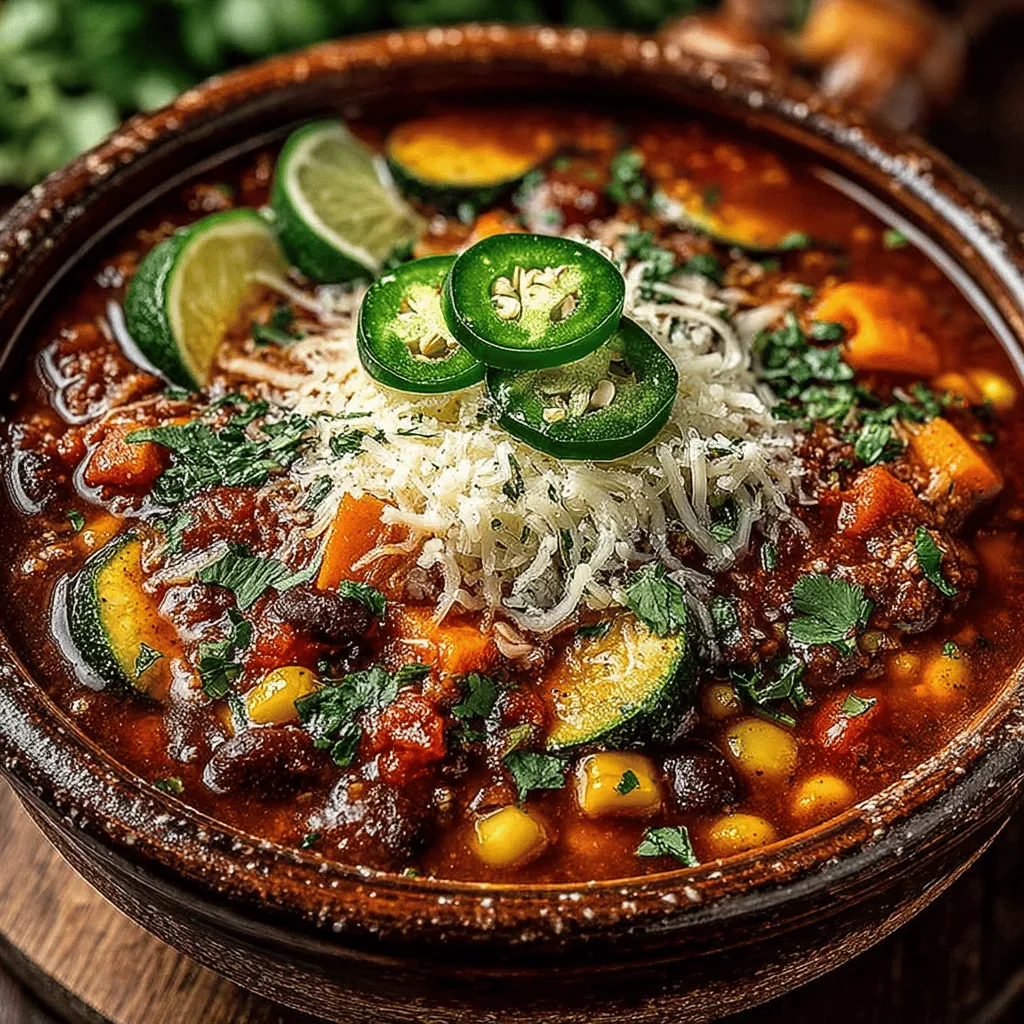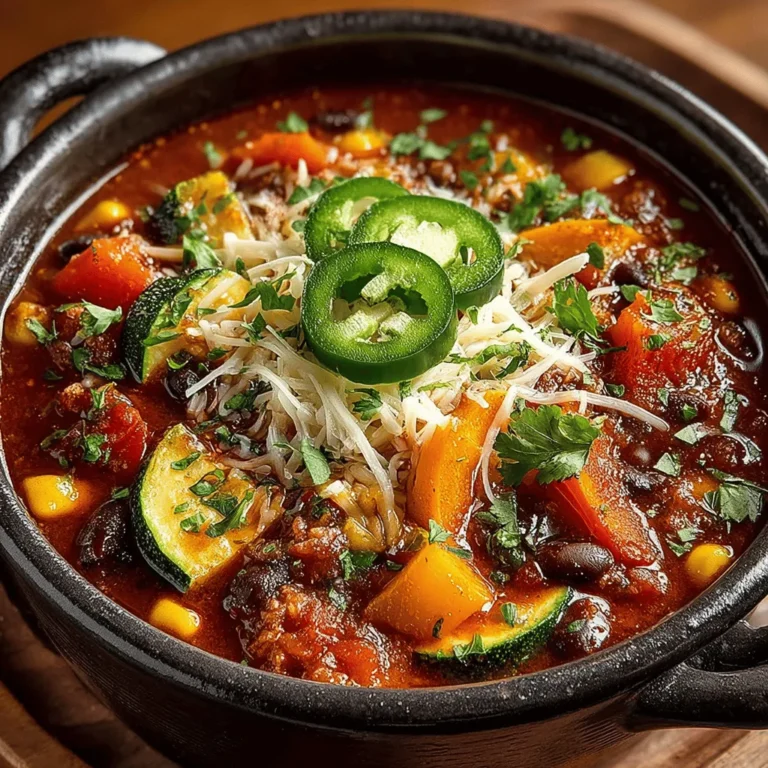Vegetable chili is a dish that embodies comfort and nourishment, making it a favorite for many. Packed with vibrant vegetables and hearty beans, this warm bowl of goodness is not only satisfying but also a healthy choice. Incorporating a variety of vegetables into your meals can enhance your diet with essential nutrients and fiber, supporting overall health. This Warm Hearth Vegetable Chili recipe caters to diverse dietary preferences, offering a delicious vegetarian and gluten-free option that everyone can enjoy.
The Appeal of Vegetable Chili
Chili is incredibly versatile, making it a perfect dish for various occasions, from family dinners to game day gatherings. The slow cooking process allows the flavors to meld beautifully, resulting in a rich, savory taste that warms the soul. As the temperatures drop, there’s nothing quite like a steaming bowl of chili to bring comfort and warmth to chilly evenings.
Ingredients
– 2 tablespoons olive oil
– 1 medium onion, diced
– 3 cloves garlic, minced
– 1 bell pepper, chopped (any color)
– 2 medium carrots, diced
– 1 medium zucchini, diced
– 1 can (15 oz) black beans, rinsed and drained
– 1 can (15 oz) kidney beans, rinsed and drained
– 1 can (28 oz) diced tomatoes (with juices)
– 2 tablespoons tomato paste
– 2 cups vegetable broth
– 1 tablespoon chili powder
– 1 teaspoon ground cumin
– 1 teaspoon smoked paprika
– Salt and pepper to taste
– Fresh cilantro for garnish (optional)
Instructions
1. In a large pot, heat the olive oil over medium heat.
2. Add the diced onion and sauté for about 5 minutes, or until softened and translucent.
3. Stir in the minced garlic and cook for an additional minute until fragrant.
4. Add the chopped bell pepper, diced carrots, and zucchini to the pot. Sauté for about 5-7 minutes, until the vegetables begin to soften.
5. Incorporate the black beans and kidney beans, stirring to combine.
6. Pour in the diced tomatoes with their juices and add the tomato paste. Stir well to mix all the ingredients.
7. Add the vegetable broth, chili powder, ground cumin, smoked paprika, salt, and pepper. Stir until everything is well combined.
8. Bring the mixture to a boil, then reduce the heat to low. Cover and let simmer for at least 30 minutes, stirring occasionally.
Ingredients Breakdown
The ingredients in this Warm Hearth Vegetable Chili not only contribute to its delightful taste but also offer numerous health benefits.
– Olive Oil: A source of healthy fats, olive oil enhances the flavor of the chili while providing heart-healthy properties.
– Vegetables: This recipe features nutrient-dense vegetables like bell peppers, carrots, and zucchini, all of which are packed with vitamins, minerals, and antioxidants.
– Beans: Black beans and kidney beans serve as excellent sources of plant-based protein, adding heartiness to the dish and keeping you full longer.
– Spices: The spices used in this chili not only elevate its flavor profile but also contribute health benefits. For instance, chili powder and cumin have anti-inflammatory properties that can support overall health.
Preparation Steps
The preparation of this vegetable chili begins with creating a rich aromatic base. Sautéing onion and garlic is crucial as they are foundational flavors that set the tone for the entire dish. The slow cooking process allows for the melding of flavors, resulting in a chili that is both comforting and nourishing.
Continue to follow the preparation steps to experience the full depth of flavor in your Warm Hearth Vegetable Chili.

Combining Vegetables in the Crockpot: Tips for Layering Ingredients Effectively
To create a balanced and flavorful warm hearth vegetable chili, it’s essential to layer your ingredients properly in the crockpot. Start with the denser vegetables such as carrots, potatoes, and bell peppers at the bottom. This allows them to cook through and become tender without losing their texture. Following these, add the softer vegetables like zucchini and corn. Finally, top with canned tomatoes and beans, as they require less cooking time and help to keep the moisture in.
When layering, consider the cooking times of each vegetable. For instance, fibrous vegetables like celery can take longer to soften, so placing them strategically will enhance the overall dish. Also, ensure that you do not overfill the crockpot; it’s better to cook in batches if necessary to maintain optimal heat circulation.
Mixing Spices: The Role of Seasoning in Enhancing the Dish
Spices are the heart of any chili recipe, and the right blend can elevate your dish to new heights. Start with a base of cumin, smoked paprika, and chili powder to build a robust flavor profile. Adjust the quantities based on your heat preference—add more chili powder for spice or more cumin for earthiness.
Experimenting with herbs such as oregano and bay leaves can add depth. Consider adding spices gradually, tasting as you go, to ensure that the flavors meld beautifully. Remember, you can always add more but cannot take away, so start with small amounts and adjust accordingly.
Adjusting Liquid: Ensuring the Right Consistency for the Chili
The consistency of your chili is crucial to its enjoyment. If your chili is too thick, add vegetable broth or water incrementally until you achieve the desired texture. Conversely, if it’s too watery, allow it to cook longer with the lid off to let some liquid evaporate.
Keep in mind that the types of vegetables you use will also impact the liquid content. For example, tomatoes will release natural juices during cooking, so factor that into your initial liquid measurements. A well-balanced chili should be hearty yet not soupy.
Cooking Process
When using a crockpot, you generally have two temperature settings: low and high. Cooking on low for 6-8 hours allows flavors to develop deeply and creates a rich, comforting dish. Cooking on high for 3-4 hours is ideal for a quicker meal without compromising too much on flavor.
The cooking time directly affects the texture and flavor of the chili. Longer cooking times allow the spices to permeate the vegetables, creating a harmonious dish. Always check for doneness by tasting the vegetables; they should be tender but not mushy. Adjust seasonings as needed before serving to ensure the flavor is just right.
Serving Suggestions
When it comes to serving your warm hearth vegetable chili, presentation matters. Opt for deep bowls that can hold generous portions, and consider using vibrant dishes to enhance the visual appeal.
Suggested Toppings
Toppings can transform your chili and provide additional layers of flavor. Consider adding shredded cheese for creaminess, a dollop of sour cream for tang, sliced jalapeños for heat, and fresh cilantro for brightness. Each topping not only complements the chili but also adds a unique texture and taste.
Accompaniments
Pair your chili with traditional sides like cornbread, which adds a sweet contrast, or a fresh salad for a refreshing crunch. Both complement the hearty nature of the chili while rounding out the meal.
Nutritional Information
This warm hearth vegetable chili is not only delicious but also packed with nutritional benefits. Each serving is rich in protein and fiber, thanks to the variety of beans and vegetables used. It’s a wholesome option for those seeking plant-based meals, aligning perfectly with healthy eating habits.
Chili is low in calories, making it suitable for various dietary needs. The abundance of vegetables provides essential vitamins and minerals, promoting overall health and wellness. By incorporating this recipe into your meal rotation, you can enjoy a satisfying, nutrient-dense dish.
Conclusion
In conclusion, this warm hearth vegetable chili brings a sense of comfort and warmth to any meal. It’s a dish that invites creativity in the kitchen, encouraging you to experiment with flavors and ingredients. Whether served as a family meal or at a gathering, this chili is sure to impress.
Embrace the cooking process, and don’t hesitate to make this recipe a staple in your home. Enjoy the warmth and joy it brings, and let it inspire you to create many more delicious meals.


